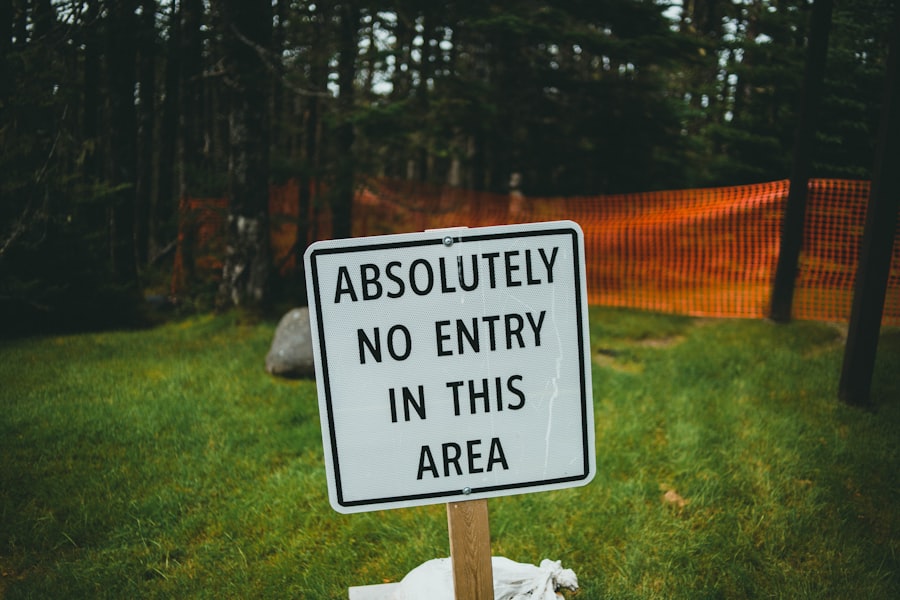As you embark on your spiritual journey, the concept of boundaries may initially seem foreign or even unnecessary. However, understanding the importance of boundaries is crucial for your growth and well-being. Boundaries serve as a protective barrier that allows you to cultivate a safe space for your spiritual exploration.
They help you define what is acceptable and what is not, enabling you to focus on your inner self without external distractions or negative influences. By establishing clear boundaries, you create an environment conducive to personal growth, allowing you to delve deeper into your spiritual practices and beliefs. Moreover, boundaries are not just about saying “no” to others; they are also about saying “yes” to yourself.
This self-affirmation is essential for spiritual growth, as it fosters a sense of self-worth and confidence. You begin to recognize that your spiritual journey is uniquely yours, and you have the power to shape it according to your values and beliefs.
In this way, boundaries become a vital tool for self-discovery, helping you navigate the complexities of your spiritual path with clarity and purpose.
Key Takeaways
- Boundaries are essential for spiritual growth as they help maintain a healthy balance in life and relationships.
- It is important to identify areas in your life where boundaries are needed, such as in relationships, work, and personal time.
- Communicating your boundaries effectively to others involves being assertive, clear, and respectful of their boundaries as well.
- Setting boundaries with yourself and your own behavior is crucial for self-discipline and personal growth.
- Recognizing when boundaries are being crossed is important for maintaining your well-being and self-respect.
Identifying Areas in Your Life Where Boundaries Are Needed
To effectively set boundaries, you first need to identify the areas in your life where they are necessary. Take a moment to reflect on your daily interactions and experiences. Are there situations or relationships that consistently drain your energy or leave you feeling overwhelmed?
Perhaps you find yourself saying “yes” to commitments that do not align with your spiritual goals or values. Recognizing these patterns is the first step toward establishing healthier boundaries. Consider the various aspects of your life—work, relationships, social obligations, and personal time.
Each of these areas may require different types of boundaries. For instance, in your professional life, you might need to set limits on how much time you dedicate to work-related tasks outside of office hours. In personal relationships, it may be necessary to communicate your needs more clearly to ensure that your emotional well-being is prioritized.
By pinpointing these areas, you can begin to create a framework for setting boundaries that support your spiritual growth.
Communicating Your Boundaries Effectively to Others

Once you have identified the areas where boundaries are needed, the next step is to communicate them effectively to others. This can often be a daunting task, as you may fear how others will react or worry about disappointing them. However, clear communication is essential for establishing and maintaining healthy boundaries.
Start by being honest and direct about your needs. Use “I” statements to express how certain behaviors or situations affect you personally. For example, instead of saying, “You always interrupt me,” try saying, “I feel unheard when I am interrupted during conversations.” It’s also important to approach these conversations with empathy and understanding.
Recognize that others may not be aware of how their actions impact you. By framing your boundaries in a way that emphasizes your feelings rather than placing blame, you create an opportunity for open dialogue. This not only helps others understand your perspective but also fosters mutual respect in your relationships.
Remember that setting boundaries is not about creating distance; it’s about nurturing healthier connections that honor both your needs and those of others.
Setting Boundaries with Yourself and Your Own Behavior
| Metrics | Results |
|---|---|
| Self-discipline | Improved |
| Self-awareness | Increased |
| Self-control | Enhanced |
| Self-care | Prioritized |
While setting boundaries with others is crucial, it’s equally important to establish boundaries with yourself. This involves recognizing patterns of behavior that may hinder your spiritual growth and taking proactive steps to change them. For instance, if you find yourself constantly engaging in negative self-talk or procrastinating on your spiritual practices, it’s time to set some internal boundaries.
Challenge yourself to create a daily routine that prioritizes self-care and spiritual reflection. Establishing boundaries with yourself also means being mindful of the influences you allow into your life. This could involve limiting exposure to negative media or toxic relationships that drain your energy.
By consciously choosing what you engage with, you empower yourself to create a more positive environment for spiritual growth. Remember that self-discipline is a form of self-love; by setting these internal boundaries, you are honoring your commitment to your spiritual journey.
Recognizing When Boundaries Are Being Crossed
As you navigate through life, it’s essential to remain vigilant about recognizing when your boundaries are being crossed. This awareness allows you to respond proactively rather than reactively. Pay attention to your feelings—if you start feeling anxious, resentful, or overwhelmed in certain situations, it may be a sign that someone is infringing upon your boundaries.
Trusting your instincts is key; if something feels off, it likely is. Additionally, observe how others respond when you communicate your boundaries. If they dismiss or challenge them repeatedly, it may indicate a lack of respect for your needs.
In such cases, it’s important to reassess the relationship and determine whether it aligns with your spiritual values. Remember that recognizing boundary violations is not about blaming others; it’s about taking responsibility for your own well-being and making necessary adjustments in your interactions.
The Relationship Between Boundaries and Self-Care in Spiritual Growth

Boundaries and self-care are intricately linked in the context of spiritual growth. When you establish healthy boundaries, you create space for self-care practices that nourish your mind, body, and spirit. Self-care is not merely a luxury; it’s a necessity for maintaining balance and harmony in your life.
By prioritizing self-care through boundary-setting, you allow yourself the time and energy needed for reflection, meditation, and other spiritual practices. Moreover, self-care reinforces the importance of boundaries by reminding you that your needs matter. When you take the time to care for yourself—whether through rest, creative expression, or connecting with nature—you send a powerful message to yourself and others: that you value your well-being.
This commitment to self-care enhances your spiritual journey by fostering resilience and clarity as you navigate challenges along the way.
Using Boundaries to Foster Healthy Relationships
Healthy relationships are built on mutual respect and understanding, both of which are cultivated through effective boundary-setting. When you establish clear boundaries with others, you create an environment where open communication can thrive. This not only strengthens existing relationships but also attracts new connections that align with your spiritual values.
In fostering healthy relationships, it’s important to remember that boundaries are not meant to isolate you; rather, they serve as a foundation for deeper connections. By being honest about your needs and limitations, you invite others to do the same. This reciprocity creates a sense of safety within relationships, allowing both parties to express themselves authentically without fear of judgment or rejection.
Overcoming Guilt and Fear When Setting Boundaries
Setting boundaries can often evoke feelings of guilt or fear—emotions that can be challenging to navigate. You may worry about disappointing others or fear that asserting your needs will lead to conflict. However, it’s essential to recognize that these feelings are natural and part of the process of establishing healthy boundaries.
Acknowledge them without judgment; they do not define your worth or the validity of your needs. To overcome guilt and fear, remind yourself of the importance of prioritizing your well-being. Setting boundaries is an act of self-respect and self-love; it allows you to show up fully in your relationships and spiritual practices.
Consider reframing your perspective: instead of viewing boundary-setting as selfishness, see it as an essential step toward creating a more balanced and fulfilling life.
Seeking Support and Guidance in Establishing Boundaries
Establishing boundaries can be a complex process, and seeking support from others can be incredibly beneficial. Whether it’s talking to a trusted friend, mentor, or therapist, sharing your experiences can provide valuable insights and encouragement as you navigate this journey. Surrounding yourself with individuals who understand the importance of boundaries can help reinforce your commitment to setting them.
Additionally, consider exploring resources such as books or workshops focused on boundary-setting and personal development. These tools can offer practical strategies and frameworks for establishing healthy limits in various aspects of your life. Remember that seeking support is not a sign of weakness; rather, it demonstrates a commitment to personal growth and well-being.
Reflecting on the Impact of Boundaries on Your Spiritual Journey
As you continue on your spiritual journey, take time to reflect on the impact that boundaries have had on your growth and development. Consider how setting limits has influenced your relationships, self-care practices, and overall sense of well-being. Reflecting on these experiences can provide valuable insights into how far you’ve come and what areas may still need attention.
Journaling can be an effective tool for this reflection process. Write down specific instances where setting boundaries led to positive outcomes or where failing to do so resulted in challenges. This practice not only helps solidify the lessons learned but also reinforces the importance of maintaining healthy boundaries moving forward.
Embracing the Freedom and Empowerment that Comes with Setting Boundaries
Ultimately, embracing the freedom and empowerment that comes with setting boundaries is one of the most rewarding aspects of personal growth. As you establish limits that honor your needs and values, you create space for authentic connections and meaningful experiences in your life. This newfound sense of empowerment allows you to navigate challenges with confidence and resilience.
By recognizing that setting boundaries is an act of self-love rather than selfishness, you open yourself up to a world of possibilities on your spiritual journey. You become more attuned to what truly matters to you and learn to prioritize those aspects without guilt or hesitation. Embrace this freedom wholeheartedly; it is a vital component of living a fulfilling life aligned with your spiritual aspirations.
After experiencing spiritual growth, setting boundaries becomes an essential practice to maintain the newfound sense of peace and clarity. Establishing these boundaries helps in protecting your energy and ensuring that your personal growth is respected by others. For more insights on how to effectively set boundaries after spiritual growth, you can explore this related article which delves into practical strategies and the importance of maintaining these boundaries in your daily life.
FAQs
What are boundaries in the context of spiritual growth?
Boundaries in the context of spiritual growth refer to the limits and guidelines that individuals set to protect their emotional, mental, and spiritual well-being. These boundaries help maintain a healthy balance in relationships and prevent individuals from being taken advantage of or overwhelmed.
Why is it important to set boundaries after spiritual growth?
Setting boundaries after spiritual growth is important because it allows individuals to maintain their newfound sense of self-awareness, self-respect, and personal growth. It helps individuals protect their energy, time, and emotional well-being, and fosters healthy relationships with others.
How can one identify the need for setting boundaries after spiritual growth?
The need for setting boundaries after spiritual growth can be identified through feelings of being overwhelmed, drained, or taken advantage of in relationships. It may also be necessary when individuals feel that their personal values, beliefs, and well-being are being compromised.
What are some common boundaries that individuals may need to set after spiritual growth?
Common boundaries that individuals may need to set after spiritual growth include limits on time and energy given to others, boundaries around personal space and privacy, and boundaries related to personal values, beliefs, and self-care practices.
How can one effectively communicate and enforce boundaries after spiritual growth?
Effective communication and enforcement of boundaries after spiritual growth involve clearly expressing one’s needs and limits to others, being assertive in upholding those boundaries, and being willing to enforce consequences when boundaries are crossed. It also involves practicing self-compassion and self-care.



